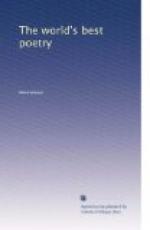II.
The rainbow comes and
goes,
And lovely is the rose;
The moon doth with delight
Look round her when the heavens are bare;
Waters on a starry night
Are beautiful and fair;
The sunshine is a glorious birth;
But yet I know, where’er I go,
That there hath passed away a glory from the earth.
III.
Now, while the birds thus sing a
joyous song,
And while the young lambs bound
As to the tabor’s sound,
To me alone there came a thought of grief;
A timely utterance gave that thought relief,
And I again am strong.
The cataracts blow their trumpets from the steep,—
No more shall grief of mine the season wrong.
I hear the echoes through the mountains throng;
The winds come to me from the fields of sleep,
And all the earth is gay;
Land and sea
Give themselves up to jollity;
And with the heart of May
Doth every beast keep holiday;—
Thou child of joy,
Shout round me, let me hear thy shouts, thou happy
shepherd boy!
IV.
Ye blessed creatures! I have
heard the call
Ye to each other make; I see
The heavens laugh with you in your jubilee;
My heart is at your festival.
My head hath its coronal,—
The fulness of your bliss, I feel, I feel it all.
O evil day! if I were sullen
While Earth herself is adorning,
This sweet May morning,
And the children are culling,
On every side,
In a thousand valleys far and wide,
Fresh flowers; while the sun shines warm,
And the babe leaps up on his mother’s arm;—
I hear, I hear, with joy I hear!—
But there’s a tree, of many, one,
A single field which I have looked upon,—
Both of them speak of something that is gone;
The pansy at my feet
Doth the same tale repeat.
Whither is fled the visionary gleam?
Where is it now, the glory and the dream?
V.
Our birth is but a sleep and a forgetting;
The soul that rises with us, our life’s
star,
Hath had elsewhere its setting,
And cometh from
afar:
Not in entire forgetfulness,
And not in utter nakedness,
But trailing clouds of glory, do we come
From God, who is our home:
Heaven lies about us in our infancy!
Shades of the prison-house begin to close
Upon the growing Boy;
But he beholds the light, and whence it
flows—
He sees it in his joy;
The Youth, who daily farther from the
east
Must travel, still is nature’s
priest
And by the vision splendid
Is on his way attended:
At length the Man perceives it die away,
And fade into the light of common day.
VI.
Earth fills her lap with pleasures of
her own;
Yearnings she hath in her own natural
kind,
And even with something of a mother’s
mind,
And
no unworthy aim,
The
homely nurse doth all she can
To make her foster-child, her inmate man,
Forget
the glories he hath known,
And that imperial palace whence he came.




